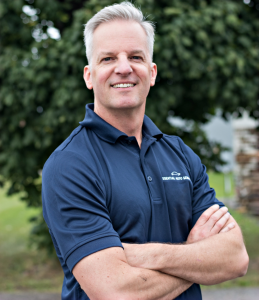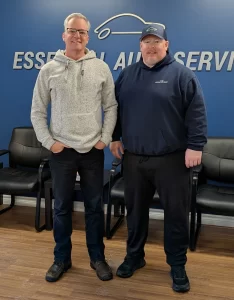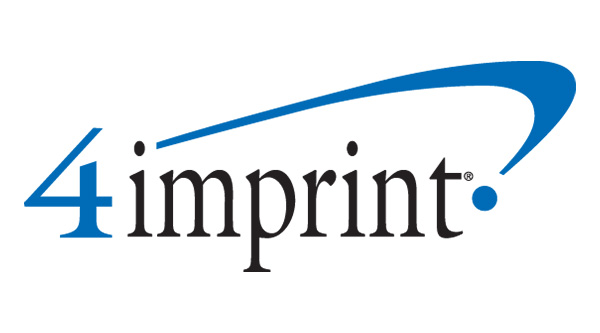“You can accomplish anything if you have a detailed plan and the courage to stick to it.” – Rich Gregg of Essential Auto Service
Leadership is not about standing at the front of the room and giving orders. It is not about holding a title or commanding respect by force. The best leaders – those who shape industries, inspire loyalty and leave behind legacies – understand something deeper.
Leadership is about vision, action, accountability and the ability to bring people together toward something greater than themselves.

Rich Gregg of Essential Auto Service
Across history and industries, from the corporate boardroom to the battlefield, the greatest leaders share fundamental principles. Their styles may differ, and they may face unique challenges, but the underlying philosophies of leadership remain strikingly consistent. This truth becomes even more evident when we examine both the towering figures of history and those leading on the ground today. For nearly a decade, Rich Gregg of Essential Auto Service in Ontario, CA, has committed himself to coaching, apprenticeships and workshops to refine and elevate his leadership skills. Though you won’t find Rich in a history book or on the cover of Forbes (yet), he nonetheless embodies the qualities that define celebrated leaders: vision, decisiveness, accountability and an unwavering commitment to improvement.
The Power of Vision: Seeing What Others Cannot
All great leaders see the world not as it is, but as it could be. This ability to articulate a compelling vision and inspire others to believe in it separates leaders from managers.
Consider Walt Disney. Before the success of Disneyland, the idea of a massive, immersive theme park seemed laughable. Amusement parks were small, dirty and poorly maintained, hardly the foundation for an empire.
Disney saw something different, and his vision was so clear that it pulled others in. Despite the initial pushback, engineers, investors and even skeptical city planners found themselves convinced by Disney’s unshakable belief.
For Rich Gregg, creating a successful business required the same clarity of vision. He understood that for his shop to thrive, his team needed to fully buy into his goals. His determination was infectious.
“You can accomplish anything if you have a detailed plan and the courage to stick to it,” he says, recognizing that the key to success isn’t simply to fix more cars, it’s about building a team that shares a common purpose. “It doesn’t take a lot of work to build a strong team culture when you hire like-minded people, treat them fairly and keep them connected to your vision.”

Rich and John of Essential Auto Service
A testament to this philosophy is his manager, John, who has been with Essential Auto Service for 25 years – a clear reflection of the stability and loyalty great leadership fosters.
The Discipline of Decision-Making
Vision alone isn’t enough. Leaders must also have the courage to make decisions. The best leaders understand that decisiveness is key to momentum. Take Henry Ford, for example. His
incredibly risky decision to introduce assembly line manufacturing was one of the most daring and consequential moves in business history. Great leaders like Ford analyze risks, but they do not hesitate when action is required.
Gregg embraces this mindset. “I am someone who has no problem taking big risks, so large decisions over the years have not been difficult to execute,” he says. Buying his first building, joining DRIVE, gaining the prestigious Master Elite status, expanding his shop and acquiring competitors were all bold moves made without hesitation.
However, like many business owners, he faced a common struggle: holding onto the wrong employees for too long. At first, he hesitated to let go of highly skilled but disruptive team members. Though they could produce results, their toxic attitudes created tension in the shop. Through this experience, Rich learned one of his hardest leadership lessons: hesitation can be costly.
“During challenging times, almost any decision is better than no action,” he explains. “Come up with a plan and execute it.”
That willingness to act, even when it’s difficult, is what separates great leaders from those who remain stuck in indecision.
The Culture of Accountability
One of the defining traits of the world’s best leaders is that they take full responsibility and demand accountability from their team, for successes, failures and everything in between.
When Harry Truman became President of the United States in 1945, he inherited one of the most consequential decisions in modern history: how to end World War II. Faced with no perfect options, Truman acted decisively instead of shifting blame. His now-famous desk plaque read: “The Buck Stops Here.”
True leadership requires owning every decision and its consequences. Gregg has instilled this same sense of accountability in his shop. His number one rule for his employees? Never lie.
“I can’t keep an eye on every decision or action an employee makes, so there has to be a high level of trust,” he explains. “We all have to be on the same page and shooting for the same goal of providing quality service and repairs with added value to our customers.”
By setting this expectation, Gregg has built a culture where accountability isn’t just a demand, it’s a shared value. Employees know that mistakes will be addressed openly, without blame or shouting, but with the clear expectation that they will learn from them. When accountability starts at the top, it flows through the entire team.
The Relentless Pursuit of Improvement
One of the greatest misconceptions about leadership is that it is a destination rather than a journey. True leaders never stop learning, adapting and improving. Few leaders embody this better than Jeff Bezos. In the early days of Amazon, he was relentless about reinvention. What started as an online bookstore quickly evolved into a retail juggernaut, then a cloud computing giant and now an entertainment powerhouse. Bezos never allowed Amazon to become comfortable with success. He constantly pushed for innovation.
This philosophy resonates deeply with Gregg, who, after 16 years of running his business, made a decision that changed everything: he started learning how to be a better business owner. “I
waited 16 years before taking any business training,” he admits. “I wish I had started that journey much sooner.”
Through DRIVE’s coaching, Rich has embraced continuous improvement, not just for himself but for his entire team. He invests in training, adapts to industry changes and pivots strategies when necessary.
During the challenges of the past few years, particularly COVID-19, Rich adapted by dialing up his marketing efforts and shifting focus to maintenance plans to compensate for the reduction in regular commuters. His team’s emphasis on customer education was a game-changer during this period of flux. “If you can really educate the customer, they make the right decisions on their own – you don’t have to sell them on the idea,” he says.
The Leadership Code: Enduring Principles
While leadership styles may vary, the core principles that define great leaders remain the same:
· A compelling vision that draws people toward a greater goal
· The courage to make decisions, even in uncertainty
· A culture of accountability, where responsibility starts at the top
· A relentless pursuit of improvement, ensuring growth never stops
These principles have defined the greatest leaders in history, from business titans to world leaders to industry innovators.
But they have also defined leaders like Rich Gregg who, though not a household name, has built a business based on integrity, vision and continuous growth.
Whether you’re running a repair shop, leading a Fortune 500 company or aspiring to leadership in any field, these lessons apply. Leadership is not about being the loudest voice in the room. It is not about power for its own sake. Leadership is about seeing what others cannot, acting when others hesitate, taking responsibility when others deflect and growing when others stagnate.
# # #
ShopOwner Magazine link (page 46) HERE
ShopOwner Magazine newsletter link HERE
ShopOwner Magazine website link HERE








 For DRIVE clients, click
For DRIVE clients, click 
